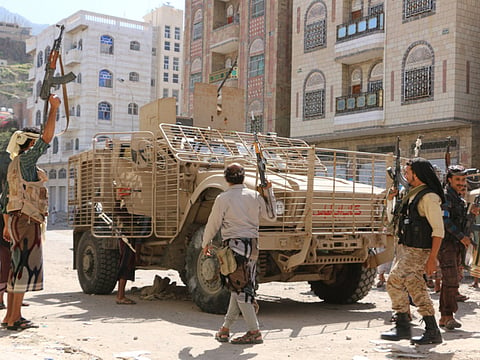Yemenis hope ceasefire will help aid efforts
Analysts say it is better to watch Al Houthi actions to see if they can be trusted

Dubai: Yemenis hope Al Houthi militias will honour a seven-day ceasefire starting on Monday night, which they believe will be a good opportunity to bring in much needed aid to civilians.
Salim Al Nahdi, a Yemeni analyst based in Cairo, said he hoped the Iran-backed Al Houthis would respect the ceasefire and allow the aid to reach civilians but, based on past experiences, he had his doubts.
“A few days ago, nearly 30 trucks loaded with aid reached Taiz, but half of it was looted by Al Houthi militia, and the other half was turned back.”
Taiz, Yemen’s third largest city, has been under a brutal Al Houthi-imposed siege for months. Conditions for residents and resistance fighters locked inside are dire.
The war in Yemen has killed nearly 6,000 people — half of them were civilians — including 637 children. According to UN figures, a total of 27,867 people were wounded during the period between March and November 12.
Yemen’s internationally-recognised president Abd Rabbo Mansour Hadi called for a ceasefire this month, which was later accepted by Al Houthis.
Yemen’s new foreign minister Abdul Malek Al Mekhlafi, who will also lead Hadi’s delegation at UN-sponsored talks in Geneva later, confirmed the ceasefire would start on “the evening of December 14.”
“We are going to the talks with serious intentions and we hope that the other side to abide by that,” he was quoted by Reuters as saying.
“I believe this is a beginning of optimism in the Yemeni crisis,” said Mohammad Al Zayat, member of the Egyptian think tank of the Egyptian Council for foreign affairs, while expressing some reservations.
“Let us wait for the UN talks before judging if there is seriousness to end the war,” he added.
“We welcome peace, dialogue and negotiations, but I doubt that Saleh will be honest in his dealings with the international community,” Aden-based Yemeni analyst Saif Al Jahafi told Gulf News.
He was referring to ousted president Ali Abdullah Saleh, who has allied himself with Al Houthi militants who have occupied parts of the country.
The hostile takeover was seen by Gulf states as an Iran-backed expansionist plan and triggered a Saudi-led Arab coalition to step in this year to help Yemenis liberate their country.
Al Jahafi said previous experiences with Al Houthis and Saleh were not favourable and he thinks they might use the ceasefire to regroup their ground forces.
“Many issues are still pending,” Al Nahdi said.
Al Zayat said the Arab coalition would not allow Al Houthis to take advantage of the ceasefire to reorganise their forces.
“For example, there are still prisoners behind bars. There are no genuine guarantees from Al Houthis.”
Sign up for the Daily Briefing
Get the latest news and updates straight to your inbox



